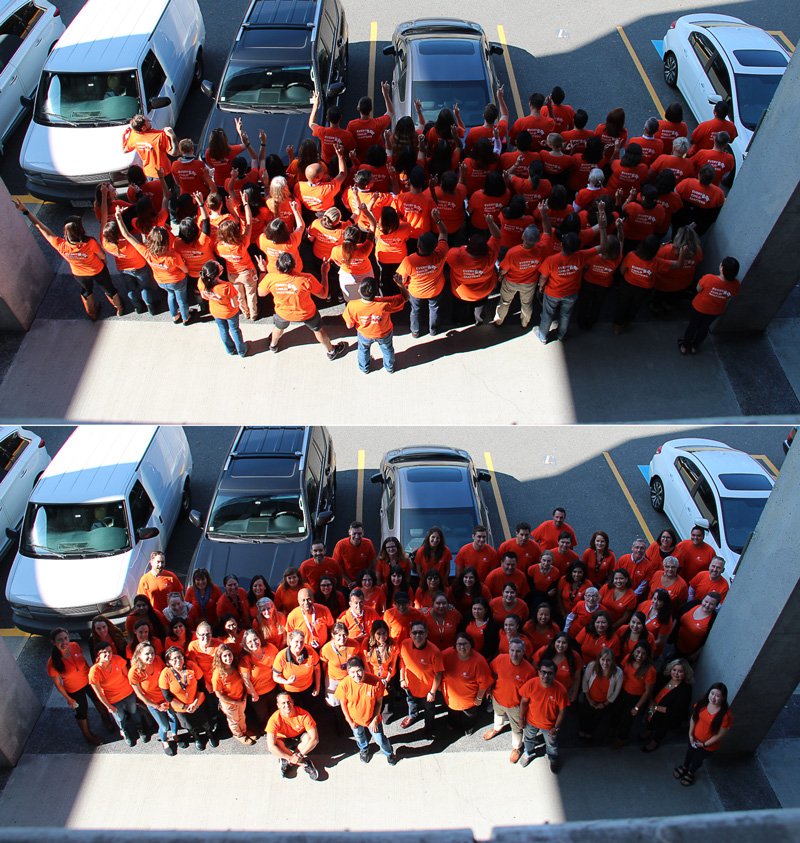
What happens to community happens to us, what happens to us happens to community.

FNHA staff in orange shirts at our Park Royal offices in West Vancouver
COAST SALISH TERRITORY (Vancouver, BC) – In honour of Orange Shirt Day, the First Nations Health Authority (FNHA) today announces that trauma-informed training is now mandatory for all frontline staff. Intergenerational trauma is a shared experience of many of our clients and employees; as such, the FNHA is actively implementing the Truth and Reconciliation Commission (TRC) recommendations related to health workforce development.
Orange Shirt Day was initiated by Phyllis (Jack) Webstad and her story of having her favourite orange shirt taken away on her first day at the St. Joseph Mission residential school. The date was chosen as it is the time of year that children were taken from their homes to residential schools and is an opportunity to continue the conversation on the intergenerational impacts of residential schools.
"We continue to hear from our Elders that the healing is not done yet. It is important to the FNHA that our employees, no matter where they sit in the organization, understand the history of the residential school and the impacts of the trauma that continue to affect our people to this day," said Joe Gallagher, Chief Executive Officer of the FNHA. "Both my mom and my dad were residential school survivors. Our household was shaped by that upbringing—and I know firsthand that understanding trauma is fundamental to cultural safety in health care for our people."
Recent research from the TRC shows that intergenerational trauma and its impacts on all First Nations people needs to be better understood and that training is necessary for all health professionals in providing appropriate and effective services. The FNHA believes that this mandatory training will better contribute to employees' connection to the work they do and empower them to address the residual trauma that First Nations communities face in a more holistic and effective way.
"We were brave children. We had to be brave to survive that. Still, many survivors don't understand their own trauma. Trauma is a foreign word to lot of us," shared Elder and IRS survivor Barney Williams Jr. of Tla-o-qui-aht First Nation. "I believe that trauma-informed training will give individuals opportunities to better understand themselves as caregivers, which will help them to engage in dialogue with survivors at the survivors' level—wherever they are at."
An awareness of what trauma is and how it is expressed, as well as the development of communication skills and tools to best support people with trauma, is fundamental for FNHA staff in providing high-quality services with, and for, First Nations. FNHA is partnering with leading thinkers in the field of trauma-informed care to develop our curriculum, with plans to launch the program in 2017.
In order to meet the urgent needs to support First Nation community health staff with a trauma-informed approach right now, FNHA will provide a series of trauma-informed training workshops commencing December 2016. These workshops will inform the development of a mandatory FNHA training program, which is an important part of the organization's overall quality agenda.
"I am so pleased to learn that the FNHA has prioritized training on trauma-informed care. Health Directors and their teams working in communities throughout the province deal with trauma on a daily basis. The impacts of colonization and residential schools are still strong and painful within our communities," said Kim Brooks, President of the First Nations Health Directors Association. "Learning about trauma related to individuals, families and communities helps us all to create safety and understanding as we work together towards healing and wellness. I wore my orange shirt with pride, for my family, for all of our families."
Over 500 FNHA employees wore orange today and observed a moment of silence to stand in solidarity with Indian Residential School (IRS) survivors and to raise awareness of the intergenerational trauma that First Nations face to this day.
The FNHA currently requires all employees to complete the San'yas Indigenous Cultural Safety Training, a first-of-its-kind program in Canada created by our partners at the Provincial Health Services Authority (PHSA) Indigenous Health program to improve the safety and quality of health services Indigenous people receive. The FNHA views the trauma training as a continuation of the good work initiated by PHSA in the area of cultural safety for First Nations health services.
Read more on the FNHA and Mental Wellness here.
Read more Orange Shirt Day at: www.orangeshirtday.org
Media Contact:
First Nations Health Authority
604.831.4898
Media@fnha.ca
Download this media release in PDF format here (130 KB)
